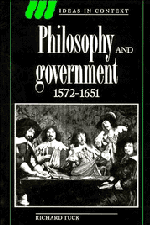2 - Scepticism, Stoicism and raison d'état
Published online by Cambridge University Press: 05 July 2011
Summary
MID-CENTURY CICERONIANISM
As I said at the beginning of Chapter 1, the history of humanist political thought before about 1620 (like the history of another aspect of humanist culture, the fine arts), can almost be told exclusively from the two urban centres of Europe, Italy and the Netherlands. While there were individual figures of great originality and influence outside these centres (such as, above all, Montaigne), any student of the period must be struck by the astonishing wealth of intellectual material produced in the great cities; it was still to Italy in particular that scholars in the studia humanitatis, poets and dramatists all over Europe looked throughout the century, and in the early seventeenth century it was possible for Trajano Boccalini to remark proudly that whereas the books of ‘Trans-Alpin writers’ were merely ‘laborious, and miraculous for the variety of reading that was in them’, Italians ‘labour with matter taken out of the Mine of their own ingeniosity, with much sweat and toil, not with stuff borrowed from other Writers’ (I ragguagli p. 23).
Moreover, it was in these two areas above all that the central political problem of the late sixteenth century was confronted and experienced as a problem: the phenomenon of the Spanish hegemony. Not since antiquity had one nation ruled so many disparate bits of the Old World, let alone the New. Charles V inherited in 1517 rule over Castile, Aragon, Upper Navarre, the Netherlands, Austria and the Kingdom of Naples; he became Holy Roman Emperor in 1519 and acquired the Duchy of Milan as an imperial fief in 1535, integrating it into the Spanish monarchy.
- Type
- Chapter
- Information
- Philosophy and Government 1572–1651 , pp. 31 - 64Publisher: Cambridge University PressPrint publication year: 1993
- 3
- Cited by

